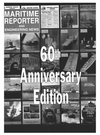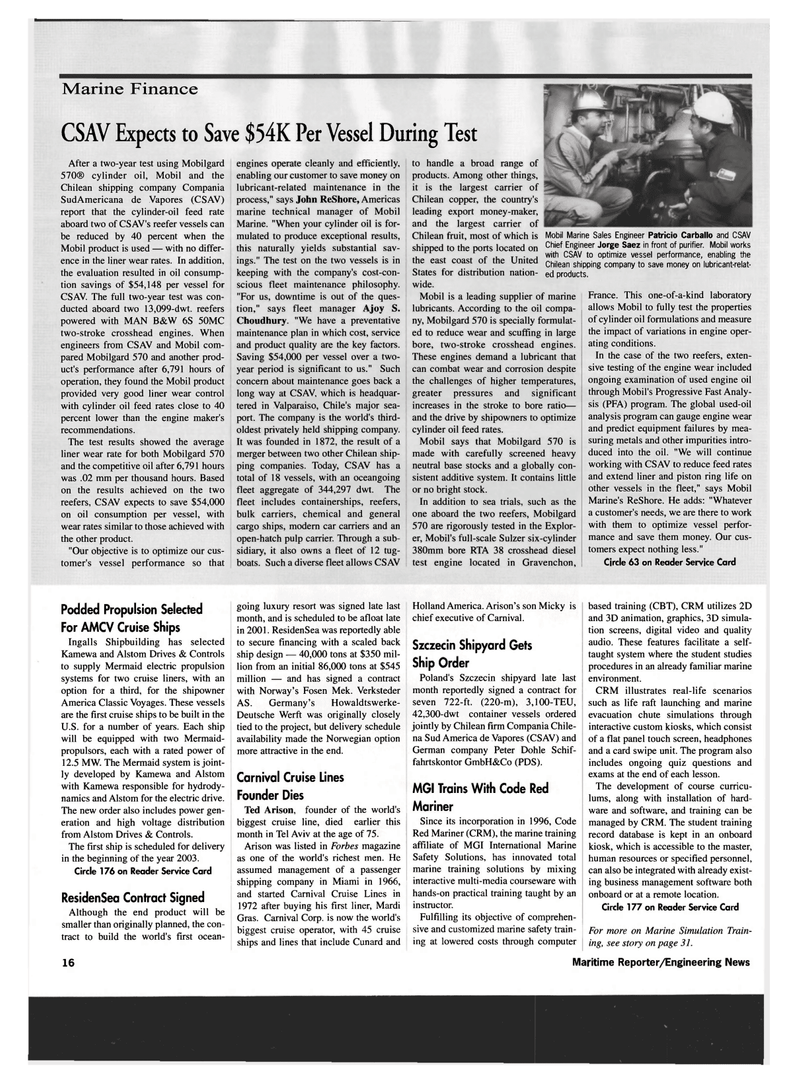
Page 16: of Maritime Reporter Magazine (October 1999)
Read this page in Pdf, Flash or Html5 edition of October 1999 Maritime Reporter Magazine
Marine Finance
CSAV Expects to Save $54K Per Vessel During Test
Mobil Marine Sales Engineer Patricio Carballo and CSAV
Chief Engineer Jorge Saez in front of purifier. Mobil works with CSAV to optimize vessel performance, enabling the
Chilean shipping company to save money on lubricant-relat- ed products.
After a two-year test using Mobilgard 570® cylinder oil, Mobil and the
Chilean shipping company Compania
SudAmericana de Vapores (CSAV) report that the cylinder-oil feed rate aboard two of CSAV's reefer vessels can be reduced by 40 percent when the
Mobil product is used — with no differ- ence in the liner wear rates. In addition, the evaluation resulted in oil consump- tion savings of $54,148 per vessel for
CSAV. The full two-year test was con- ducted aboard two 13,099-dwt. reefers powered with MAN B&W 6S 50MC two-stroke crosshead engines. When engineers from CSAV and Mobil com- pared Mobilgard 570 and another prod- uct's performance after 6,791 hours of operation, they found the Mobil product provided very good liner wear control with cylinder oil feed rates close to 40 percent lower than the engine maker's recommendations.
The test results showed the average liner wear rate for both Mobilgard 570 and the competitive oil after 6,791 hours was .02 mm per thousand hours. Based on the results achieved on the two reefers, CSAV expects to save $54,000 on oil consumption per vessel, with wear rates similar to those achieved with the other product. "Our objective is to optimize our cus- tomer's vessel performance so that engines operate cleanly and efficiently, enabling our customer to save money on lubricant-related maintenance in the process," says John ReShore, Americas marine technical manager of Mobil
Marine. "When your cylinder oil is for- mulated to produce exceptional results, this naturally yields substantial sav- ings." The test on the two vessels is in keeping with the company's cost-con- scious fleet maintenance philosophy. "For us, downtime is out of the ques- tion," says fleet manager Ajoy S.
Choudhury. "We have a preventative maintenance plan in which cost, service and product quality are the key factors.
Saving $54,000 per vessel over a two- year period is significant to us." Such concern about maintenance goes back a long way at CSAV, which is headquar- tered in Valparaiso, Chile's major sea- port. The company is the world's third- oldest privately held shipping company.
It was founded in 1872, the result of a merger between two other Chilean ship- ping companies. Today, CSAV has a total of 18 vessels, with an oceangoing fleet aggregate of 344,297 dwt. The fleet includes containerships, reefers, bulk carriers, chemical and general cargo ships, modern car carriers and an open-hatch pulp carrier. Through a sub- sidiary, it also owns a fleet of 12 tug- boats. Such a diverse fleet allows CSAV to handle a broad range of products. Among other things, it is the largest carrier of
Chilean copper, the country's leading export money-maker, and the largest carrier of
Chilean fruit, most of which is shipped to the ports located on the east coast of the United
States for distribution nation- wide.
Mobil is a leading supplier of marine lubricants. According to the oil compa- ny, Mobilgard 570 is specially formulat- ed to reduce wear and scuffing in large bore, two-stroke crosshead engines.
These engines demand a lubricant that can combat wear and corrosion despite the challenges of higher temperatures, greater pressures and significant increases in the stroke to bore ratio— and the drive by shipowners to optimize cylinder oil feed rates.
Mobil says that Mobilgard 570 is made with carefully screened heavy neutral base stocks and a globally con- sistent additive system. It contains little or no bright stock.
In addition to sea trials, such as the one aboard the two reefers, Mobilgard 570 are rigorously tested in the Explor- er, Mobil's full-scale Sulzer six-cylinder 380mm bore RTA 38 crosshead diesel test engine located in Gravenchon,
Holland America. Arison's son Micky is chief executive of Carnival.
Szczecin Shipyard Gets
Ship Order
Poland's Szczecin shipyard late last month reportedly signed a contract for seven 722-ft. (220-m), 3,100-TEU, 42,300-dwt container vessels ordered jointly by Chilean firm Compania Chile- na Sud America de Vapores (CSAV) and
German company Peter Dohle Schif- fahrtskontor GmbH&Co (PDS).
MGI Trains With Code Red
Mariner
Since its incorporation in 1996, Code
Red Mariner (CRM), the marine training affiliate of MGI International Marine
Safety Solutions, has innovated total marine training solutions by mixing interactive multi-media courseware with hands-on practical training taught by an instructor.
Fulfilling its objective of comprehen- sive and customized marine safety train- ing at lowered costs through computer
France. This one-of-a-kind laboratory allows Mobil to fully test the properties of cylinder oil formulations and measure the impact of variations in engine oper- ating conditions.
In the case of the two reefers, exten- sive testing of the engine wear included ongoing examination of used engine oil through Mobil's Progressive Fast Analy- sis (PFA) program. The global used-oil analysis program can gauge engine wear and predict equipment failures by mea- suring metals and other impurities intro- duced into the oil. "We will continue working with CSAV to reduce feed rates and extend liner and piston ring life on other vessels in the fleet," says Mobil
Marine's ReShore. He adds: "Whatever a customer's needs, we are there to work with them to optimize vessel perfor- mance and save them money. Our cus- tomers expect nothing less."
Circle 63 on Reader Service Card based training (CBT), CRM utilizes 2D and 3D animation, graphics, 3D simula- tion screens, digital video and quality audio. These features facilitate a self- taught system where the student studies procedures in an already familiar marine environment.
CRM illustrates real-life scenarios such as life raft launching and marine evacuation chute simulations through interactive custom kiosks, which consist of a flat panel touch screen, headphones and a card swipe unit. The program also includes ongoing quiz questions and exams at the end of each lesson.
The development of course curricu- lums, along with installation of hard- ware and software, and training can be managed by CRM. The student training record database is kept in an onboard kiosk, which is accessible to the master, human resources or specified personnel, can also be integrated with already exist- ing business management software both onboard or at a remote location.
Circle 177 on Reader Service Card
For more on Marine Simulation Train- ing, see story on page 31.
Podded Propulsion Selected
For AMCV Cruise Ships
Ingalls Shipbuilding has selected
Kamewa and Alstom Drives & Controls to supply Mermaid electric propulsion systems for two cruise liners, with an option for a third, for the shipowner
America Classic Voyages. These vessels are the first cruise ships to be built in the
U.S. for a number of years. Each ship will be equipped with two Mermaid- propulsors, each with a rated power of 12.5 MW. The Mermaid system is joint- ly developed by Kamewa and Alstom with Kamewa responsible for hydrody- namics and Alstom for the electric drive.
The new order also includes power gen- eration and high voltage distribution from Alstom Drives & Controls.
The first ship is scheduled for delivery in the beginning of the year 2003.
Circle 176 on Reader Service Card
ResidenSea Contract Signed
Although the end product will be smaller than originally planned, the con- tract to build the world's first ocean- going luxury resort was signed late last month, and is scheduled to be afloat late in 2001. ResidenSea was reportedly able to secure financing with a scaled back ship design — 40,000 tons at $350 mil- lion from an initial 86,000 tons at $545 million — and has signed a contract with Norway's Fosen Mek. Verksteder
AS. Germany's Howaldtswerke-
Deutsche Werft was originally closely tied to the project, but delivery schedule availability made the Norwegian option more attractive in the end.
Carnival Cruise Lines
Founder Dies
Ted Arison, founder of the world's biggest cruise line, died earlier this month in Tel Aviv at the age of 75.
Arison was listed in Forbes magazine as one of the world's richest men. He assumed management of a passenger shipping company in Miami in 1966, and started Carnival Cruise Lines in 1972 after buying his first liner, Mardi
Gras. Carnival Corp. is now the world's biggest cruise operator, with 45 cruise ships and lines that include Cunard and 16 Maritime Reporter/Engineering News

 15
15

 17
17
